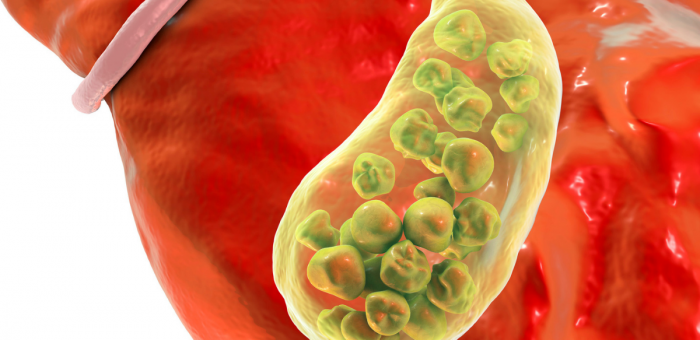What Drives Gallbladder Dysfunction?

About the Author

Dr. Jeanne Sandheinrich, D.C.
Dr. Jeanne Sandheinrich, D.C. is co-founder and an esteemed chiropractor at First Step Family Wellness. As a St. Louis native, she has a deep connection to her community and is passionate about providing exceptional care to her clients.
Gallbladder Dysfunction
Gallbladder dysfunction must be one of the most common issues seen in my office. I have lost count of how many patients and friends have either had gallbladder issues or surgery to remove the organ. Why is this so common? How come surgery and removal is the most common treatment for this organ? My guess would be the ease in which they can remove the organ, but I am here to tell you there is a better way to get this simple organ back to functioning properly.
Let me add something before we move on. If you are currently having gallbladder attacks and are having unbearable gallbladder pain, then seek the proper medical attention. Gallbladder removal might be what must happen for you and that is ok. This paper is for those that are noticing gallbladder symptoms, indigestion, and do not tolerate fatty foods well. So, if that sounds like your situation, then this article is for you.
Can you heal a dysfunctional gallbladder?
Dealing with gallbladder pain and symptoms is no doubt tiresome and can affect how you feel. Restoring gallbladder function IS possible. It helps if you understand why your gallbladder is being dysfunctional to get a better grasp on how it’s possible, and then how to do so.
What does a dysfunctional gallbladder feel like?
Typically, people suffering from gallbladder dysfunction have intense abdominal pain. This pain tends to worsen after eating. Particularly if you consume a heavy meal, or foods that are high in fat or are super greasy. Due to the gallbladder being inflamed and swollen when it’s not functioning properly, people will notice: pain above their stomach. The discomfort can be bad enough to cause nausea, vomiting, and diarrhea. They may also be dealing with a backache and/or pain in the right shoulder blade and experience fever and chills. Pain and discomfort that is caused from gallbladder dysfunction can be mild and come and go, or it can be consistent and severe. Again, if the pain is intense and unbearable, seek the proper medical attention.
What foods irritate the gallbladder?
While there is more to restoring the function of your gallbladder than just avoiding certain foods, avoiding foods that irritate the gallbladder is a good place to start!
Some foods you should avoid are:
-carbonated soft drinks
-alcohol
-fatty food
-greasy and fried foods
-acidic food
-dairy
-eggs
-sugary food
What causes a dysfunctional gallbladder?
There are a few simple steps that need to be accomplished first before we know where to start. The question every doctor should be asking when a patient presents with gallbladder issues is WHY is the gallbladder not working well. An answer to this question might surprise you.
The stomach is one of the organs that directly affects the gallbladder. It goes all the way back to chemistry class to explain how this happens. The stomach is responsible for the production of hydrochloric acid (low pH) and the gallbladder is responsible for the bile salts (high pH). When the Chyme leaves the stomach and enters the small intestine, it is very acidic due to the stomach acid. This is where the body balances the pH and uses the bile salts.
However, if your stomach does not produce much Hydrochloric acid, then there is less of a need for the bile salts. Given enough time the gallbladder starts to become sluggish and fill with small granules then eventually stones. This happens because the body will reabsorb the Sodium that is sitting in the gallbladder for different jobs in the body (use it or lose it in effect). When that happens, water follows sodium and starts to dehydrate the organ.
What happens if you have your gallbladder removed?
The gallbladder stores the bile that aids in digesting your food. The liver produces the bile and then stores them in the gallbladder. When the gallbladder is removed, the liver has nowhere to store the bile, so then it continuously drips into your digestive system. Sometimes it’s an emergency situation and gallbladder removal is necessary. However, restoring gallbladder function is much more ideal if you’re just starting to experience some gallbladder symptoms.
How do you fix a dysfunctional gallbladder?
Now you may start to ask yourself, that’s all well and good but how do I know if I am producing enough stomach acid. If you are a person that suffers from acid reflux or are currently taking PPI drugs (lowers stomach acid) then you qualify as a person that is not making enough stomach acid. If you want to read more about exactly how that happens, please read the article about the stomach.
There is still hope for you because the correction for these problems is fairly simple. I accomplish this in my office using a combination of enzymes and supplementation. First the stomach must be corrected and then the gallbladder needs to be supplied with the proper nutrition for correct function. So, as you can see there is a natural and simple solution to your issue. If you have any questions or would like to schedule an appointment call (314) 805-7837.